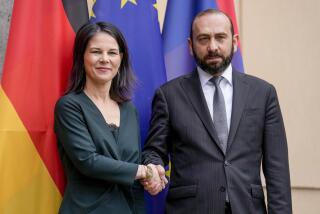West Urged to Exploit Openings for Easing Tensions
- Share via
POTSDAM, East Germany — Experts at an East-West security conference here generally agreed Saturday that the West should take advantage of current opportunities for easing tensions with Communist Eastern Europe.
“There are opportunities to be seized that may not come again for a long time,” declared Ignac Golob, who heads Yugoslavia’s delegation at European security talks that have been under way for years in Vienna.
At the conference here, sponsored by the New York-based Institute for East-West Security Studies, most of those taking part agreed that both sides should move quickly toward further agreements on arms control. Most delegates also agreed that closer links in the economies of the nations of East and West would serve to reduce international tensions.
Much of the discussion among representatives of a dozen nations, including the United States and the Soviet Union, were closed to the public, but on Saturday, the chairmen of the working groups, of whom Golob was one, summed up for the press the conclusions reached.
Many of those taking part urged the United States to keep up President Reagan’s momentum in search of a pact for a 50% cut in strategic nuclear weapons by the superpowers and not let negotiations on the issue languish until a new U.S. administration takes over in January.
German Professor’s Appeal
As Prof. Karl Kaiser, director of the West German Research Institute for Foreign Policy, put it, “We should find ways and means to find solutions to additional arms control measures. We should look for those areas where we can find quick action and not get bogged down in a lot of details, but seek areas of agreement.”
While most delegates to the meeting in this historic city favored closer economic cooperation between East and West, U.S. Secretary of Commerce C. William Verity noted in a speech Saturday that the West’s ability to influence Soviet economic reforms is limited.
The East European nations suffer from “massive systemic failings” in their economies, Verity said, and these can be solved only “by changing the system itself--by a repudiation of rigid, centrally planned monopolies and a move toward meaningful prices and decentralized enterprise.”
Western economic actions can affect Eastern economies, Verity said, “but only at the margin.”
“The fact is that the East cannot look to the West to bail it out,” the U.S. official said. “There is no shortcut to reform that can be bought by turning to the West for assistance.
Massive Changes Needed
“Only genuine and far-reaching changes in the economic systems of the East will lead to a better economic future for their people,” he said.
A different perspective was offered by West German Foreign Minister Hans-Dietrich Genscher, who said in a speech that, while Eastern economic reform is not dependent on the West, “close economic collaboration with the West improves that policy’s prospects and may expedite it.”
Soviet leader Mikhail S. Gorbachev’s attempt to restructure Communist economies for the better should not be regarded “as a threat, but as an opportunity both for building a peaceful order in Europe and for our own economies,” Genscher said.
Genscher also mentioned the historic significance of Potsdam as a meeting place.
This southeastern suburb of Berlin, a traditional city of religious tolerance, was turned into a sumptuous summer resort by the Prussian ruler Frederick the Great 200 years ago. In the summer of 1945, one of the former Prussian ruling family’s rambling villas, the Cecilienhof, was the site of the post-war conference on Germany attended by the Allied leaders of that day: President Harry S. Truman, Britain’s Prime Minister Winston Churchill and his successor Clement Attlee, and the Soviet Union’s Josef Stalin.
Soviet Army Headquarters
Today, the handsome city serves as one of the headquarters for the huge, 400,000-man Soviet army contingent based in East Germany.
At the East-West conference, the first of its kind in East Germany, the participants agreed on the need for conventional arms reduction in Europe, and some Communist speakers criticized the United States for not pushing harder for such cuts.
More to Read
Sign up for Essential California
The most important California stories and recommendations in your inbox every morning.
You may occasionally receive promotional content from the Los Angeles Times.










